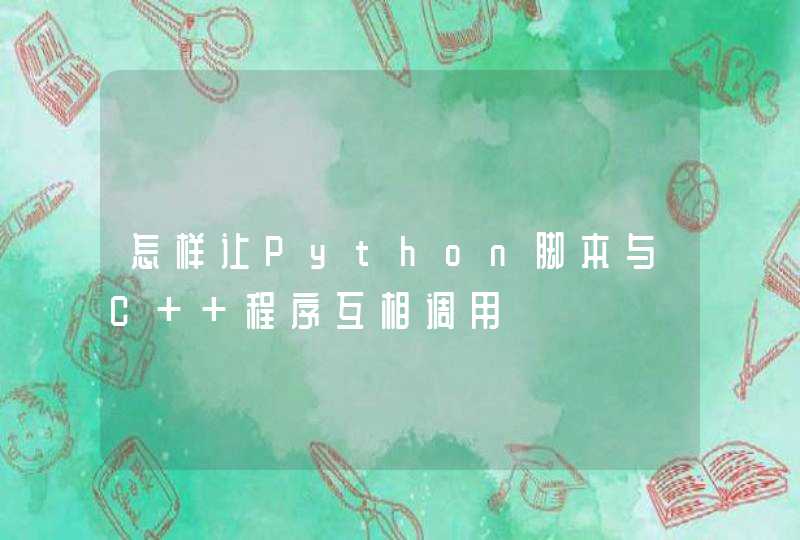
__declspec(dllexport) int Fun(int a, int b)
否则在加载该dll时会提示找不到该符号
在windows下可以通过vs自带的dumpbin工具查看可被调用符号
dumpbin /exports test.dll
C函数在调用过程中关于参数传递和压栈由多种规定,作为dll提供给其他程序调用时,必须明确并统一为同一种调用规定,否则会导致栈破坏,编译器负责具体实现调用规定,主要有以下几种调用规定
python下调用C库有多种方式,ctypes是其中一种比较方便的,调用时首先需要加载dll文件,根据C dll的调用规定不同需要使用不同接口,使用ctypes需要 import ctypes 库
对于简单的C函数,例如 int add(int a, int b) , 此时就可以直接调用了,如
对于较复杂的C函数的参数情况,ctypes调用时对入参和出餐做一定处理,这里分情况讨论
以上包含了几种主要的参数传递情况,ctypes也提供了一个较为完整的python类型和C类型的对照,如下:
Python是解释性语言, 底层就是用c实现的, 所以用python调用C是很容易的, 下面就总结一下各种调用的方法, 给出例子, 所有例子都在ubuntu9.10, python2.6下试过1. Python 调用 C (base)
想在python中调用c函数, 如这儿的fact
#include <Python.h>
int fact(int n)
{
if (n <= 1)
return 1
else
return n * fact(n - 1)
}
PyObject* wrap_fact(PyObject* self, PyObject* args)
{
int n, result
if (! PyArg_ParseTuple(args, "i:fact", &n))
return NULL
result = fact(n)
return Py_BuildValue("i", result)
}
static PyMethodDef exampleMethods[] =
{
{"fact", wrap_fact, METH_VARARGS, "Caculate N!"},
{NULL, NULL}
}
void initexample()
{
PyObject* m
m = Py_InitModule("example", exampleMethods)
}
把这段代码存为wrapper.c, 编成so库,
gcc -fPIC wrapper.c -o example.so -shared -I/usr/include/python2.6 -I/usr/lib/python2.6/config
然后在有此so库的目录, 进入python, 可以如下使用
import example
example.fact(4)
2. Python 调用 C++ (base)
在python中调用C++类成员函数, 如下调用TestFact类中的fact函数,
#include <Python.h>
class TestFact{
public:
TestFact(){}
~TestFact(){}
int fact(int n)
}
int TestFact::fact(int n)
{
if (n <= 1)
return 1
else
return n * (n - 1)
}
int fact(int n)
{
TestFact t
return t.fact(n)
}
PyObject* wrap_fact(PyObject* self, PyObject* args)
{
int n, result
if (! PyArg_ParseTuple(args, "i:fact", &n))
return NULL
result = fact(n)
return Py_BuildValue("i", result)
}
static PyMethodDef exampleMethods[] =
{
{"fact", wrap_fact, METH_VARARGS, "Caculate N!"},
{NULL, NULL}
}
extern "C" //不加会导致找不到initexample
void initexample()
{
PyObject* m
m = Py_InitModule("example", exampleMethods)
}
把这段代码存为wrapper.cpp, 编成so库,
g++ -fPIC wrapper.cpp -o example.so -shared -I/usr/include/python2.6 -I/usr/lib/python2.6/config
然后在有此so库的目录, 进入python, 可以如下使用
import example
example.fact(4)
3. Python 调用 C++ (Boost.Python)
Boost库是非常强大的库, 其中的python库可以用来封装c++被python调用, 功能比较强大, 不但可以封装函数还能封装类, 类成员.
http://dev.gameres.com/Program/Abstract/Building%20Hybrid%20Systems%20with%20Boost_Python.CHN.by.JERRY.htm
首先在ubuntu下安装boost.python, apt-get install libboost-python-dev
#include <boost/python.hpp>
char const* greet()
{
return "hello, world"
}
BOOST_PYTHON_MODULE(hello)
{
using namespace boost::python
def("greet", greet)
}
把代码存为hello.cpp, 编译成so库
g++ hello.cpp -o hello.so -shared -I/usr/include/python2.5 -I/usr/lib/python2.5/config -lboost_python-gcc42-mt-1_34_1
此处python路径设为你的python路径, 并且必须加-lboost_python-gcc42-mt-1_34_1, 这个库名不一定是这个, 去/user/lib查
然后在有此so库的目录, 进入python, 可以如下使用
>>>import hello
>>>hello.greet()
'hello, world'
4. python 调用 c++ (ctypes)
ctypes is an advanced ffi (Foreign Function Interface) package for Python 2.3 and higher. In Python 2.5 it is already included.
ctypes allows to call functions in dlls/shared libraries and has extensive facilities to create, access and manipulate simple and complicated C data types in Python - in other words: wrap libraries in pure Python. It is even possible to implement C callback functions in pure Python.
http://python.net/crew/theller/ctypes/
#include <Python.h>
class TestFact{
public:
TestFact(){}
~TestFact(){}
int fact(int n)
}
int TestFact::fact(int n)
{
if (n <= 1)
return 1
else
return n * (n - 1)
}
extern "C"
int fact(int n)
{
TestFact t
return t.fact(n)
}
将代码存为wrapper.cpp不用写python接口封装, 直接编译成so库,
g++ -fPIC wrapper.cpp -o example.so -shared -I/usr/include/python2.6 -I/usr/lib/python2.6/config
进入python, 可以如下使用
>>>import ctypes
>>>pdll = ctypes.CDLL('/home/ubuntu/tmp/example.so')
>>>pdll.fact(4)
12




































































